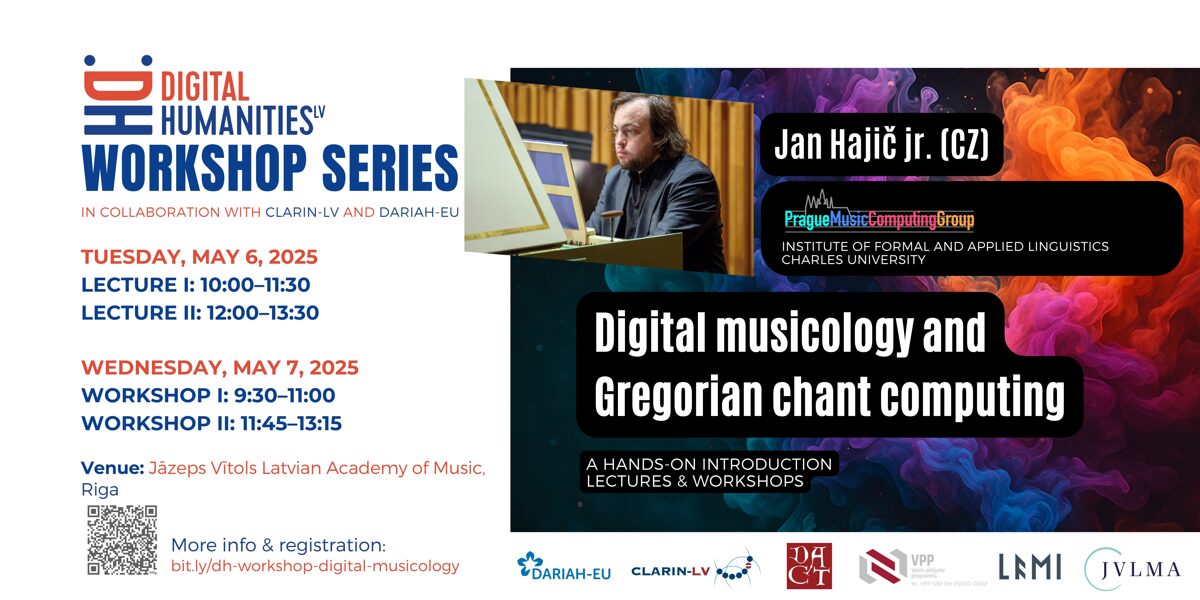6-7 May Jan Hajič, PhD, will give lectures and workshops on Digital Musicology and Computer Analysis of Gregorian Chants in Riga

On 6-7 May, Jan Hajič, PhD will give a hands-on introduction to musicology in the digital domain for the intrepid musicologists at the Jāzeps Vītols Latvian Academy of Music (K. Barona street 1). The program is intended for musicologists (and musicians) at all levels of seniority, from undergrads thinking about their theses to senior researchers thinking about their grants. In two lectures and two workshops, the series will introduce digital musicology and showcase its strengths and limitations. No computing background necessary, though musically inclined computer scientists are most welcome to join as well.
Tuesday, May 6
Lecture I : 10:00–11:30 What is digital musicology?
Lecture II : 12:30–13:30 The state of Optical Music Recognition
Wednesday, May 7
Workshop I : 9:30–11:00 Exploring the digital chant ecosystem
Workshop II : 11:45–13:15 Experimenting with mode and lost chants
Registration
Lectures and workshops are free, but registration is required. Please register by filling in the application form by 30 April: https://forms.gle/rL2h1DogqwEnYGAfA
Please bring your own computer to the workshops.
Working language: English.
Venue
Jāzeps Vītols Latvian Academy of Music, Rīga, room 102 (06.05.), room 120 (07.05.)
Specific information and contacts: [email protected]
Annotations of lectures and workshops
Lecture 1: What is digital musicology?
It is vaguely obvious that the digital domain presents great opportunities for musicology, but at the same it may not be as obvious what specifically these opportunities are. This talk aims to simply introduce what digital musicology actually is: what it does, how it works, and why it even deserves to be singled out like this, and hopefully it will provide inspiration for attendees’ own work in the field. No knowledge of computer science is expected (though of course computer people interested in music are welcome to join!)
Lecture 2: The state of Optical Music Recognition.
Optical Music Recognition (OMR), the process of converting images of music notation to structured, digitally editable encodings, is a key technology for enabling truly large-scale digital musicology. Unfortunately, it is far from resolved, despite the immense progress of computer vision in the past decade — but there are clear lights on the horizon. This talk gives an overview of OMR state of the art, some available tools and their limitations, and resources available for those interested in applying OMR to their collections.
Workshop 1: Exploring the digital chant ecosystem
Getting our hands dirty, we will take a look around the digital chant ecosystem: the Cantus database, Cantus Index, and then we start working with the chant data contained therein. We take a look at some basic statistics of the dataset and visualise it. This will all happen in a google colab environment, so no need to install anything! All you need is an internet connection, no programming or math background required (but it may be a good idea to do a Python tutorial ahead of time).
Workshop 2: Experimenting with mode and lost chants
Getting our hands a bit more dirty, we try and replicate some of the findings for chant modality. Using models from ecology, we will then try and estimate how many chants we have not observed yet, showcasing one of the great methodological advantages that computational research has over traditional methods.
Jan Hajič jr. heads the Prague Music Computing Group at the Faculty of Mathematics and Physics, Charles University in Prague. He recently completed the Genome of Melody project, researching Gregorian chant with methods from bioinformatics, and is co-investigator of the international Digital Analysis of Chant Transmission project, where he leads the Chant Analytics team for computational chant scholarship. He is also PI of the OmniOMR project, for optical recognition of musical manuscripts using deep learning. Outside academia, he is also active as a harpsichordist: highlights include Prague Spring 2023 with Andreas Scholl, operas at the baroque theatre in Český Krumlov, and his ensembles performed at early music festivals in Czechia and abroad.
Funding and support
The seminar is organised within the project “Towards Development of Open and FAIR Digital Humanities Ecosystem in Latvia” (VPP-IZM-DH-2022/1-0002) in collaboration with the CLARIN-LV and DARIAH-EU, Prague Music Computing Group, Institute of Literature, Folklore and Art of the University of Latvia, Jāzeps Vītols Latvian Academy of Music, and project Digital Analysis of Chant Transmission.